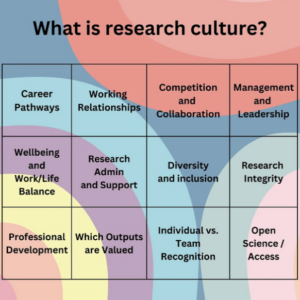Our first CRASSH seminar series in research culture focused on ‘how can we foster good research culture in our departments?’ The background to this is a growing movement towards improving culture and working environment in academia. However, research culture is a huge issue that can’t be tackled all at once. It encompasses many categories, some of which are shown in the graphic below.

Graphic designed by Action Research on Research Culture team (cam.ac.uk)
So how can we improve research culture at Cambridge? What efforts have already been made in this space? Should the approach be top-down or bottom-up? These are some of the questions we tackled at the first session, organised and chaired by Sophie Pickford, an Art Historian and Senior Teaching Associate at CCTL. We asked speakers Charlotte Lemanski (Geography), Nick Bampos (Chemistry) and Myfanwy Hill (Senior tutor, King’s College) to participate, as they are known to us as people who have made grassroots efforts to improve research culture in their areas; ‘early adopters’, if you will. They also represent a wide range of experience throughout the University and represent different academic disciplines. Although CRASSH focuses on ASSH disciplines, in this area we need to learn from each other and recognise the similarities and differences facing research culture in different fields. For example, a researcher in medieval history who spends the majority of their time in the archives may face issues of isolation, but so may a researcher in theoretical physics.
We started off with what the speaker’s conception of research culture is. Charlotte noted that research culture ‘is something that, by its very nature, is not written down’. i.e., it is the unwritten norms of an environment. Myfanwy came to an awareness of research culture via recognition of contributions, and formative experiences of academia and how they shape your outlook. Nick mentioned that he has felt an obligation as a deputy department head, that people who come to Cambridge feel comfortable and valued in their workplace.
In terms of the Cambridge environment, we discussed that the competitiveness and standing of the university can be a benefit. However, it also exerts a pressure on researchers and can increase feelings of imposter syndrome, and competition amongst colleagues rather than collaboration.
There was debate surrounding the tension between teaching and non-teaching responsibilities. Should all areas of Cambridge have a remit to impart knowledge to junior colleagues and students? Should all researchers be expected to teach? There is no straightforward answer to these questions, but the provision of training and support for those who want to teach but perhaps do not have the confidence should be expanded. Departments also need a blend of different skill sets; the issues set in when all skill sets are not valued equally.
The panel members discussed how we need to ‘humanise’ senior academics, as people who have lives outside of work, mental health concerns and skills they are working to improve. If we all continue to obfuscate everything outside of our jobs, it normalises to those junior to us that academia is all there is, which is not true for the majority of researchers. Senior academics who are content in their roles will also be better placed to improve the culture for those around them. Charlotte mentioned how she authored a paper on her experiences of childcare in academia, which was supported by her colleagues and further helped to set an inclusive tone.
Junior researchers should be able to see a career path that moves in the direction of those of their senior colleagues. Nick mentioned that all external speakers at Dept. of Chemistry events write (and sometimes give an extra talk on) their career path, to highlight the journey they’ve taken, which may not always have been linear. MyFanwy echoed this by saying that Kings aims to be more transparent about who is a fellow and how they got there.
We discussed how colleges can act as a resource for interaction among disciplines, and also give a space for people to present their research ideas. For example, MyFanwy mentioned the idea of seminar events based round a wide concept, such as ‘time’. Any researcher with a link to this area can present, whether it be someone who works on apoptosis in cells or a philosophy researcher looking at perception and reality. In terms of ASSH subjects, Charlotte highlighted that the concept of the ‘supervisor / PI/manager’ is different than in STEM subjects. She is not necessarily named on student papers and the concept of the research group is looser; supervision has less of a direct effect on the career of the senior academic and it is seen as part of their role in the academic community. Conversely, in Chemistry, research groups can be huge and the financial and career-building aspect of the relationship can be more prominent.
We touched finally on how we can affect change. The panel felt that local change was necessary. As Nick put it ‘Cambridge is a bottom-up university; this is its great strength and its great weakness’. Group philosophies and expectations should be established. People need to genuinely buy into it. Charlotte felt that individual leaders in departments need to set the agenda. MyFanwy reiterated the value in conversations and dialogue on this area, which establish a new (and higher) bar for expectations in terms of research culture.
We’d like to thank the fantastic panel members for this seminar, and the audience for insightful questions.

